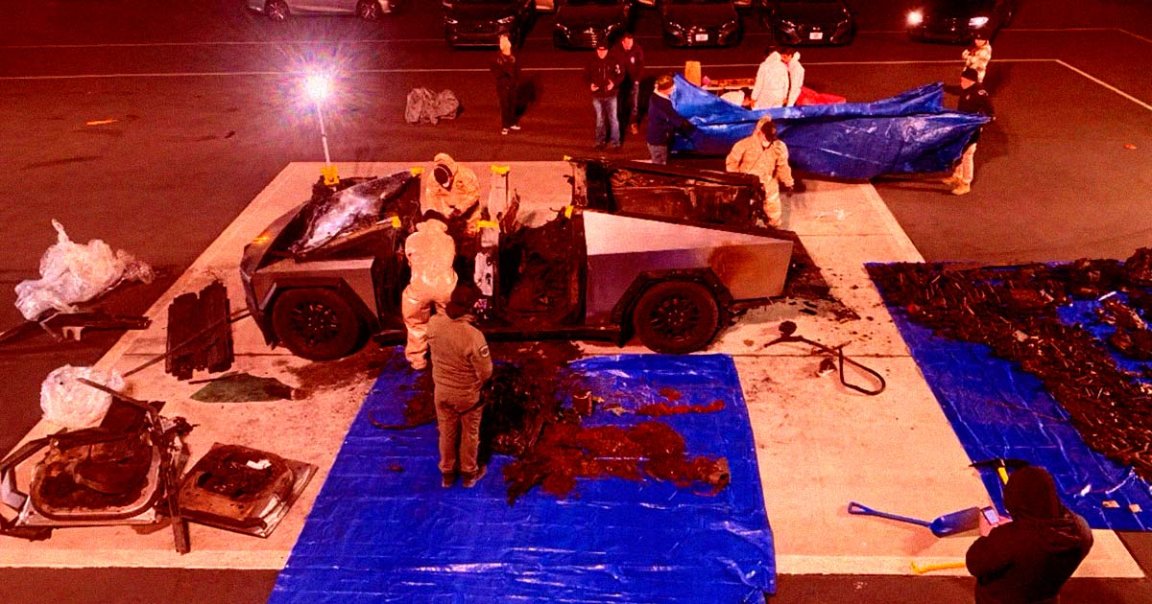
Last week, an active-duty US Army soldier died from a self-inflicted gunshot wound right before blowing up the Tesla Cybertruck he had rented in front of the Trump Towers hotel in Las Vegas using a crudely-built explosive and fireworks.
The 37-year-old Green Beret soldier named Matthew Livelsberger left behind a deranged manifesto, calling the incident a “wake-up call” for the country.
The contents of the note suggest that Livelsberger was “struggling with PTSD and other issues,” FBI special agent Spencer Evans told reporters, as quoted by the Associated Press, with the soldier saying he needed to “cleanse my mind” of his fallen comrades and the “burden of the lives I took.”
Most salaciously, according to Military.com, Livelsberger appears to have also authored a December 31 email, widely shared in the military community, that made unsubstantiated claims about the claims of mysterious drone sightings that made headlines for weeks at the end of the year. Livelsberger alleged they were of Chinese origin and technologically highly advanced. (In reality, experts have since argued that there was no evidence of any nefarious activity and that many of the sightings could have far more mundane explanations.)
“What we have been seeing with ‘drones’ is the operational use of gravitic propulsion systems powered aircraft by most recently China in the east coast, but throughout history, the US,” reads the email, which Livelsberger allegedly sent to a podcast called “The Shawn Ryan Show.”
“The so what is because of the speed and stealth of these unmanned AC, they are the most dangerous threat to national security that has ever existed,” it continued. “They basically have an unlimited payload capacity and can park it over the [White House] if they wanted. It’s checkmate.”
Las Vegas officials told Military.com that they had “strong evidence to suggest that it was the subject that wrote it, but we haven’t conclusively proven that yet.”
But as officials have pointed out, Livelsberger was clearly showing signs of emotional distress, meaning the tragic blast was almost certainly neither a political stunt aimed at Trump and Musk, nor an insider with explosive information about unidentified flying objects. In actuality, his death was almost certainly the result of some combination of misinformation, violent rhetoric, and a mental health crisis.
Following the incident last week, Livelsberger’s motive became a major point of contention, especially considering the optics of the situation: Tesla’s Cybertruck has become a political lightning rod, synonymous with the EV maker’s CEO Elon Musk’s increasingly extremist views.
The choice of target, a hotel part-owned by his number one ally, president-elect Donald Trump, also suggested that Livelsberger may have wanted to send an explicitly political message.
The explosion didn’t damage the hotel, but injured seven nearby bystanders.
“It’s not lost on us that it’s in front of the Trump building, that it’s a Tesla vehicle, but we don’t have information at this point that definitively tells us or suggests it was because of this particular ideology,” Evans told reporters last week.
Investigators are now poring over Livelsberger’s medical records to see whether he was suffering from mental health issues or received treatment.
But considering his actions, there’s a very good chance that such issues may have played a role, highlighting a pervasive issue among the military’s ranks. According to the US Department of Veterans Affairs, seven percent of US veterans will have PTSD at some point in their lives.
More on the incident: Dunce-Like Senator Posts Photo of “Drone” That’s Actually a TIE Fighter From “Star Wars”